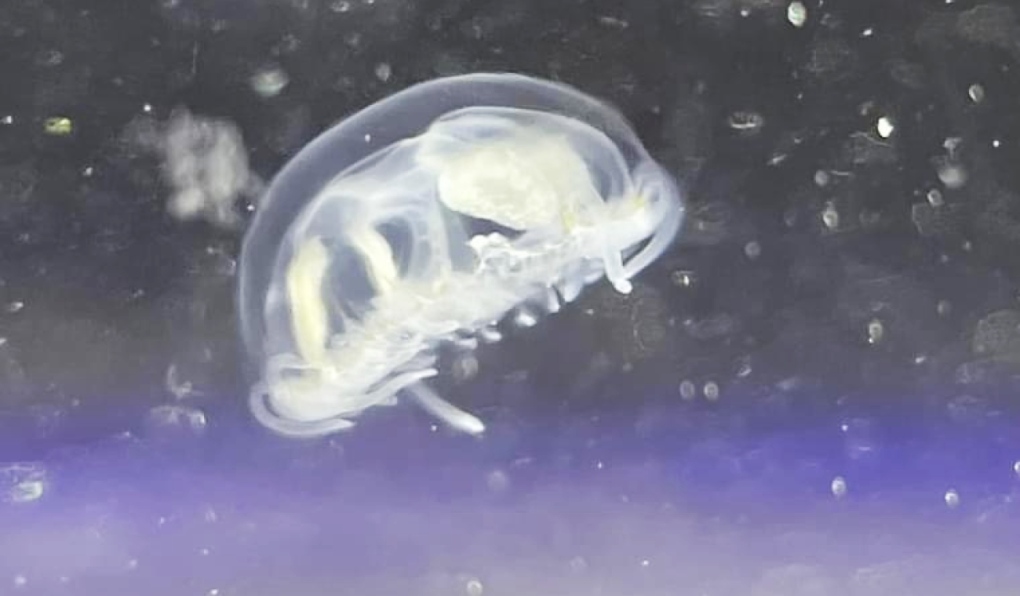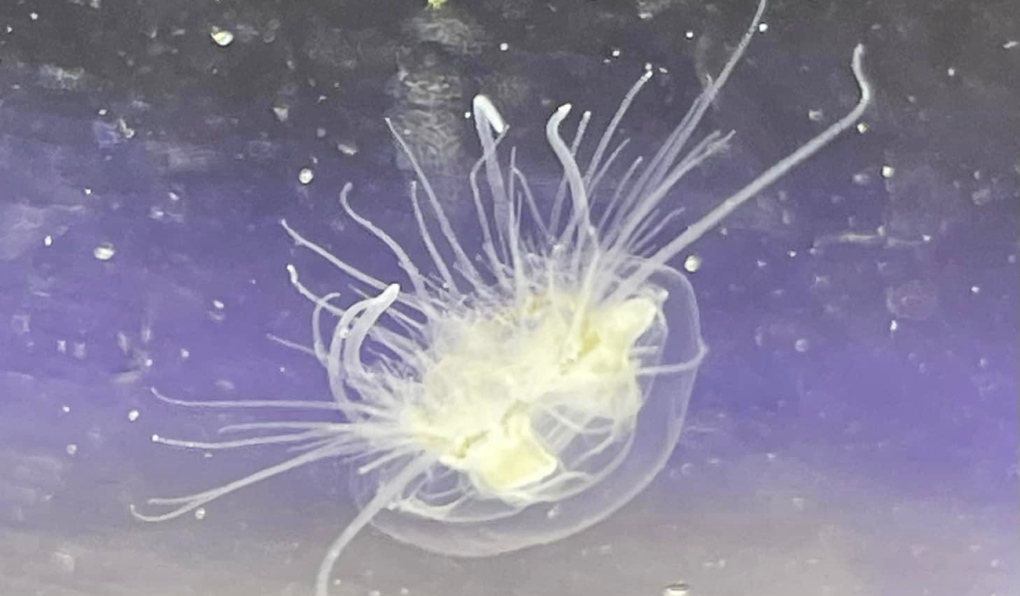Invasive jellyfish species spotted in northern Ontario lake for the first time
For the last 70 years, an invasive species from China has been slowly making its way north. In the last few weeks, it finally arrived in Sudbury, Ont.
Freshwater jellyfish were first reported in the Great Lakes about 70 years ago, with sightings emerging over the years from Manitoulin Island and Espanola.
More recently, scuba divers Jason Fox and Robert Harris spotted them in Ramsey Lake in the Bell Grove area of the water Aug. 26. Harris spotted them first.
"We were diving at Bell Grove beach, which is our kind of go-to spot for a quick dive in Sudbury without driving out of town," said Fox, an instructor at The Scuba Shop in Sudbury.
"(Harris) kinda' actually cupped his hands to show me and then when he opened his hands, it was gone."
The pair surfaced and Harris told him what he saw.
"He said, 'I swear I saw a jellyfish,'" Fox said.
"I thought, well, you know what, I remember seeing some news articles about them being spotted at Manitoulin."
Harris said he wasn't sure what it was at first.
"Sometimes you will see algae and the transparency of the algae might kinda' give the illusion of a jellyfish," he said. "So I think my first thought was maybe this is algae but when you see it doing its jellyfish thing, it was clearly jellyfish."
In the last couple of weeks, he and Fox been taking photos and videos of the photogenic, tiny creatures, which are about the size of a dime.
 This is the first time freshwater jellyfish have been reported in Ramsey Lake. They were first reported in the Great Lakes about 70 years ago, with sightings emerging over the years from Manitoulin Island and Espanola. (Photo courtesy of Jason Fox)
This is the first time freshwater jellyfish have been reported in Ramsey Lake. They were first reported in the Great Lakes about 70 years ago, with sightings emerging over the years from Manitoulin Island and Espanola. (Photo courtesy of Jason Fox)
They spotted more on subsequent dives and others in the lake reported seeing them, as well. So they contacted the Ministry of Natural Resources and Forestry to report what they saw -- and kept diving and taking photos.
"Sunday, we were out and we (saw) about 22, I think on the first dive," Fox said.
"And probably about 50 on the second dive that we did the same day. So we were really surprised to see that many. It was like, wow, this is strange but kind of cool."
They collected some in jars, something Fox said they ordinarily wouldn't have done.
"As divers, we are taught and teach others not to touch or take items or life from the water," he said.
"But when I knew they were invasive and I wanted proof, I figured a few in a bottle for proof wouldn’t hurt."
John Gunn, director of Laurentian University's Living With Lakes Centre, said reports of freshwater jellyfish are becoming more common. He said they eat plankton and there haven't been any reports of them doing harm.
"It's surprising to see them (in Ramsey)," Gunn said. "They're another immigrant moving around the world … They're more of a novelty than a nuisance."
Jeff Brinsmead, senior invasive species biologist with the Ministry of Natural Resources and Forestry, said the freshwater jellyfish arrived in Europe from China about 150 years ago and confirmed they have been reported in Canada for the last 70 years.
 This is the first time freshwater jellyfish have been reported in Ramsey Lake. They were first reported in the Great Lakes about 70 years ago, with sightings emerging over the years from Manitoulin Island and Espanola. (Photo courtesy of Jason Fox)
This is the first time freshwater jellyfish have been reported in Ramsey Lake. They were first reported in the Great Lakes about 70 years ago, with sightings emerging over the years from Manitoulin Island and Espanola. (Photo courtesy of Jason Fox)
Brinsmead said this is the first report he's heard that they are in Ramsey Lake.
"They are in 44 states in the U.S. as well, I believe, and five provinces," he said.
"In Canada, our first population that we're aware of showed up, as you mentioned, about 70 years ago, and that was not too far outside of Ottawa, and they've kind of been spreading around Ontario ever since."
Exactly how they arrived isn't certain, but it could be through bilge water, in bait buckets or by being stuck to other aquatic plants.
The creatures can remain polyps for years before maturing into tiny jellyfish. They can sting, but Brinsmead said they are so small, a bite would feel like a small scratch, if noticed at all.
While not much research has been done in Canada, studies in the U.S. have not found any proof that they cause harm to ecosystems, he said.
While they can remain as polyps for years, once they mature and become jellyfish, they only live for a month or so.
"Because of the short life stage as an adult, they probably aren't likely to (have) any effect on ecosystems," Brinsmead said.
When asked whether they will keep moving north, he said their path isn't linear. They have already been spotted in places like Thunder Bay and Hearst, but are likely to keep spreading.
For more information, click here.
-- With files from Alana Everson
CTVNews.ca Top Stories

Forecasters issue 'bomb cyclone' warning for B.C., with 120 km/h winds predicted
An Environment Canada meteorologist says a so-called "bomb cyclone" is expected to bring powerful winds to Vancouver Island and the British Columbia coast this week.
Canada's rising youth unemployment could cost the country billions, report says
The unemployment rate for Canadians between 18 and 24 was 12.8 per cent in October, according to Statistics Canada, more than double the rate of those older than 25.
Tories call on Boissonnault to resign amid apology over Indigenous ancestry claims
Members of Parliament returned to Ottawa on Monday after a weeklong break with no sign of a resolution to the House stalemate, tempers ramped back up, and renewed calls for a Liberal cabinet minister to resign — or be fired.
B.C. RCMP detachment refutes social media claims of human trafficking, kidnapping
Mounties in B.C.'s Sea to Sky region say there is "no credible evidence" to support claims circulating on social media that a human trafficking ring is operating in Squamish or that there have been kidnappings in the community.
Men from Ontario, B.C. charged in 'mistaken identity' shooting, RCMP say
Two men from Ontario and British Columbia have been charged in connection with a 2022 shooting that left an innocent victim seriously wounded.
NHL referee Mitch Dunning communicative, can move extremities following violent collision
NHL referee Mitch Dunning is fully communicative and can move all his extremities following a violent collision with Colorado defenseman Josh Manson in Monday night's game at Philadelphia.
Dave Coulier debuts shaved head with a little help from his friend John Stamos
As Dave Coulier continues to go through cancer treatment, he is getting some support from his friend John Stamos.
Some Canada-U.S. border crossing times will change in 2025. Here's what you need to know
The Canada Border Services Agency (CBSA) says it will adjust the opening hours of crossing points across the country early next year.
Thief steals disabled 15-year-old dog's wheelchair
Caring for a senior pet is no walk in the park, especially when the pet can't walk at all. A Colorado woman was shocked to find her dog's wheelchair missing from the porch Tuesday morning


































